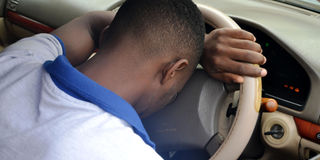Reasons why your car won’t start

If possible, call a mechanic who will be able to diagnose the problem and offer possible solutions. PHOTO/Gabriel Buule
What you need to know:
There are a number of reasons why your car will not start, but some are more common than others. Below are some of them and some advice to ensure your car stays in top shape.
Every truly bad day begins with a car that won’t start. We have seen it in the movies, read it in books, and that is just how it is. If you have owned one of “those” cars, then you know exactly what I am talking about. Every morning, you hold your breath while turning that key.
Then one morning you turn the key and you get nothing or get anything less than an engine roaring to life. Starting problems can be frustrating because there are so many things under the hood that can keep a car from starting. Pretty much everything under the hood can keep the car from starting. But what is interesting is that many seasoned mechanics are not intimidated by this situation.
Why you may ask, well it is simply because there are still only a few ingredients needed to get a car running and figuring out which is missing is usually quite simple. The four main elements needed for a running engine are spark, air, fuel, and compression.
Key
To troubleshoot a no-start problem, start at the beginning of the line, the battery, and work your way back. Some tests for a no-start problem are simple while others are a technical nightmare. Nonetheless, you need to figure out why the car will not start.
First off, dumb as it may sound, are you using the right key? Sometimes it is simply the steering locking when you park with the wheels turned all the way to one side and remove the key. To correct this, force the steering wheel, first in one direction, then the other, while trying to turn the key.
Battery
Secondly when you turn the key to start, you may hear a single click or nothing at all, or you may hear a rapid series of clicks, or you may hear the cranking sound, but it goes very slowly.
The most common cause for any of these is either a weak or dead battery, or a dirty or corroded connection to the battery. Before you go any further, turn your interior light on, and try to start the car. If the light is dim or goes dim when you turn the key to start, start asking why you have been postponing the purchase of those jumper cables.
If the interior light is bright when you turn it on and does not change when you turn the key to start, the battery is probably okay. It could be that you do not have the transmission selector in park or neutral in an automatic transmission vehicle.
Try starting again with the transmission selector in neutral. It could also be a problem with the ignition switch or connecting wiring, starter motor or starter solenoid.
I once had a physics teacher who always expressed that the simplest electronic problem is when you switch on say a TV and nothing happens, and the most complex problem is when you turn on the TV and the screen turns just white.
Using the same analogy, the most horrendous and notorious car starting troubles are when the engine cranks normally, but it does not fire (start). You turn the key to start and hear the starter motor crank the engine, but when you release the key, the cranking stops and there is silence. This means that the battery and starting motor are working properly, but the engine is not firing. If you continue cranking the engine this way, the battery will eventually run down and will need to be recharged, but the battery and starter are not the cause of your problem.
Fuel
There are several causes for this type of no-start condition, the most common being that you are simply out of fuel, which you can simply add. If it is not fuel, then you are in that area many drivers and mechanics do not want to be as Donald Lule, a lecturer with Nakawa Vocational institute, says.
Here, he adds, you might need to check the spark plugs, fuel pump and its pressure then the worst-case scenario of compression. Low compression is usually a result of some sort of mechanical issue. Maybe it is something as simple as a stuck valve, a valve that does not seat properly, or a timing chain that skipped a tooth. Maybe your spark plug was not in all the way. Or the lack of compression could be the result of wear.
Clogged fuel filter
According to fiix.io, an online portal, if your fuel filter is clogged, fuel will not be able to reach the engine. This makes it difficult for your car to burn the fuel it needs to get going. Fuel filters should be changed every 15,000 to 20,000 kilometres, so consider swapping fuel filters next time you get your car serviced.
Faulty starter
A broken starter is another common reason your car will not start. A starter is an electrical motor that is connected to the battery. Its role is to set the engine (pistons, crankshaft, in motion when you turn the ignition switch on. Once the engine starts and is in motion, the starter’s job is complete. If the starter goes bad, the engine will not crank properly or may not crank at all when you turn the ignition key on. If you hear a clicking noise when you try to start your vehicle, a broken or weakened starter could be the reason why your car is not starting.



